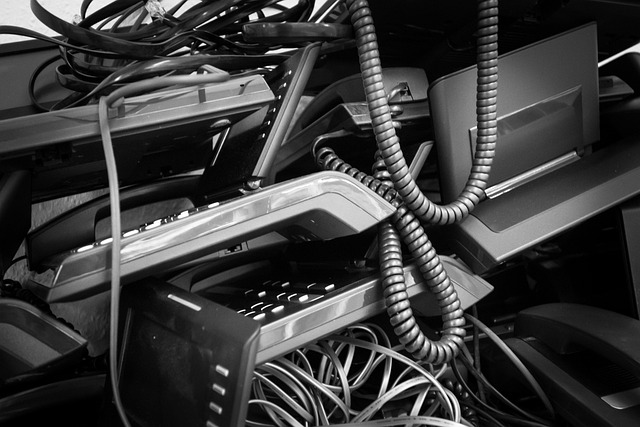Startups in Boston and New York embrace sustainable IT asset disposal practices to meet regulatory compliance, protect data security, and contribute to environmental sustainability. By partnering with licensed e-waste management vendors, they ensure secure data erasure, ethical recycling, and adherence to local regulations like NY's strict e-waste laws. This approach enhances their corporate image, promotes a circular economy, and reduces environmental impact through responsible IT equipment retirement.
Boston startups have an opportunity to lead the way in sustainable technology practices through effective e-cycling. This guide explores crucial aspects of e-waste management, offering insights into legal and ethical considerations unique to New York state. Discover innovative strategies for IT asset disposal, from eco-friendly recycling options to local partnerships. Join us as we navigate the journey towards reducing environmental impact through responsible startup initiatives.
- E-Waste Management: Boston Startups' Guide
- Sustainable IT Asset Disposal Strategies
- Legal and Ethical Considerations in NY
- Eco-Friendly Technology Recycling Options
- Partnering with Local Recycling Centers
- Reducing Environmental Impact: Case Studies
E-Waste Management: Boston Startups' Guide

In Boston, startups are increasingly recognizing the importance of e-waste management and responsible IT asset disposal. With rapid technological advancements, businesses often find themselves with outdated equipment, creating a significant challenge in terms of environmental impact and data security. Proper e-waste handling is crucial not just for compliance with local regulations but also to safeguard sensitive information. Boston startups can ensure secure IT disposal by partnering with reputable vendors who adhere to strict guidelines for old tech disposal.
Many states, including New York, have implemented stringent rules regarding electronic waste collection and recycling. By following these guidelines, Boston-based startups can contribute to a greener environment while ensuring their data is securely erased from old devices. Efficient e-waste management not only reduces the digital footprint but also helps businesses stay compliant, avoiding potential legal issues related to IT asset disposal.
Sustainable IT Asset Disposal Strategies

In today’s digital age, startups in Boston and beyond are recognizing the importance of sustainable IT asset disposal strategies. As businesses grow or evolve, so does their technology, leading to a surge in computer hardware retirement plans. The traditional method of simply disposing of old equipment is no longer environmentally responsible or compliant with regulations. Startups can embrace eco-friendly practices by implementing IT asset recycling Boston programs that ensure proper disposal and potential revenue generation from reusable components.
One key aspect is secure data erasure New York, a critical step to protect sensitive business information. With strict privacy laws like those in New York State, startups must guarantee that all data stored on retiring computer hardware is securely erased or destroyed. This not only safeguards client confidentiality but also prevents potential legal issues and maintains the startup’s reputation for responsible environmental management.
Legal and Ethical Considerations in NY

In New York, businesses dealing with IT asset disposal have a legal obligation to handle electronic waste responsibly. The state’s strict regulations on e-cycling ensure that sensitive data is securely destroyed and hazardous materials are recycled or disposed of in an environmentally safe manner. Startups in Boston, when considering IT asset disposal NY, should partner with licensed and certified e-waste management companies who adhere to these stringent standards. Failure to comply can result in significant fines and legal repercussions, underscoring the importance of due diligence when selecting a computer hardware retirement plan.
Additionally, ethical considerations play a crucial role in responsible e-cycling practices. Startups must ensure that their chosen data destruction companies NYC employ secure methods for erasing digital information from devices to prevent unauthorized access or data breaches. By adhering to these legal and ethical guidelines, Boston startups can contribute to the sustainable management of IT waste collection while ensuring the safety and privacy of sensitive business data.
Eco-Friendly Technology Recycling Options

In today’s digital age, startups in Boston and New York are increasingly recognizing the importance of eco-friendly technology recycling options as part of their IT asset disposal processes. With a focus on sustainability and data protection act compliance NY, businesses are exploring computer hardware retirement plans to minimize their environmental footprint. E-cycling involves responsibly recapturing and reusing valuable materials from obsolete or damaged electronics, thereby reducing electronic waste (e-waste) that often ends up in landfills.
By opting for IT asset recycling Boston and beyond, startups can contribute to a greener future while ensuring secure data destruction. This not only aligns with environmental regulations but also helps businesses maintain their reputation as responsible corporate citizens. Moreover, effective e-cycling programs enable companies to recover valuable resources, potentially reducing costs associated with IT asset disposal while promoting a circular economy.
Partnering with Local Recycling Centers

Startups in Boston have a unique opportunity to contribute to the city’s sustainability goals by partnering with local recycling centers for IT asset disposal. Many businesses generate valuable but outdated electronics, and proper e-cycling is essential for environmental protection. By collaborating with nearby recycling facilities, startups can ensure their electronic assets are responsibly recovered and reused. This partnership provides several benefits, including efficient data destruction, which is crucial for maintaining customer trust in the era of digital transformation.
These asset disposal consulting firms often have established relationships with recycled electronics suppliers, enabling startups to find a market for their surplus equipment. The process involves securely transporting end-of-life IT components to specialized facilities where skilled professionals handle data eradication and component recycling. This collaborative approach not only supports local eco-initiatives but also aligns with state-mandated electronic asset recovery programs in NYC and beyond.
Reducing Environmental Impact: Case Studies

E-cycling, or responsible recycling of electronic waste, is a growing trend among startups in Boston and New York, driven by a pressing need to reduce their environmental footprint. This practice involves not only IT asset disposal Boston NY but also ensuring that old electronics are recycled or reused in an eco-friendly manner. Case studies from leading tech companies in these regions show significant reductions in e-waste when implementing robust computer recycling programs Massachusetts.
For instance, a renowned software startup in Boston successfully collaborated with local IT equipment salvage companies to achieve 90% e-waste diversion rates. This was accomplished through strategic partnerships and the adoption of NY state e-waste laws, which mandate proper disposal and recycling of electronic devices. Such initiatives not only benefit the environment by minimizing toxic substance leaching but also contribute to a circular economy, where valuable resources are recovered from discarded electronics.
E-cycling is not just a responsibility but an opportunity for Boston startups to contribute to a greener future. By adopting sustainable IT asset disposal strategies, such as partnering with local recycling centers and adhering to legal and ethical guidelines in both Boston and New York, businesses can reduce their environmental impact significantly. As seen in the case studies presented, proactive e-waste management not only benefits the planet but can also enhance a startup’s public image and foster innovation within the community. Embracing eco-friendly technology recycling options ensures that old IT assets find new life, creating a circular economy and preserving our natural resources for future generations.














